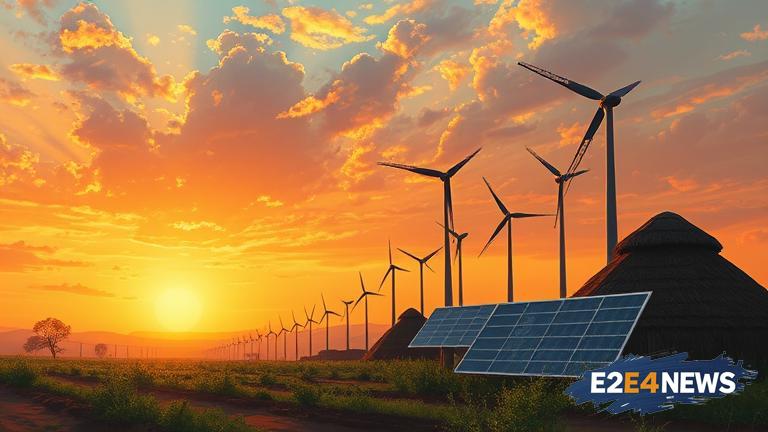The African continent is witnessing a significant shift towards renewable energy, driven by the need to address the pressing issues of energy access, climate change, and sustainable development. With many countries still struggling to provide electricity to their populations, renewable energy has emerged as a viable solution. Solar and wind power are becoming increasingly popular, with many African nations investing heavily in these sectors. For instance, South Africa has set ambitious targets to increase its renewable energy capacity, while Morocco is aiming to generate 52% of its electricity from renewable sources by 2030. Egypt, too, has launched several initiatives to promote the use of renewable energy, including the construction of the world’s largest solar park. The benefits of renewable energy are numerous, ranging from reduced greenhouse gas emissions to improved air quality and enhanced energy security. Moreover, the cost of renewable energy is decreasing, making it more competitive with fossil fuels. This trend is expected to continue, with the International Energy Agency (IEA) predicting that renewable energy will account for 60% of the world’s power generation by 2050. Africa’s renewable energy revolution is also creating new opportunities for economic growth and job creation. The sector is attracting significant investment, with many international companies and organizations partnering with African governments to develop renewable energy projects. Furthermore, the growth of renewable energy is also driving innovation, with many African startups and entrepreneurs developing new technologies and business models to support the sector. However, despite the progress made, there are still significant challenges to be addressed, including the need for greater investment in energy infrastructure and the development of more effective policies to support the growth of renewable energy. Additionally, the integration of renewable energy into the grid remains a complex issue, requiring careful planning and management to ensure a stable and reliable supply of electricity. Nevertheless, the future of renewable energy in Africa looks promising, with many experts predicting that the continent will play a major role in the global transition to a low-carbon economy. As the demand for energy continues to grow, African countries are well-positioned to leverage their abundant renewable energy resources to drive economic development and reduce their dependence on fossil fuels. The African Union’s Agenda 2063, which aims to promote sustainable development and energy access across the continent, is also expected to play a key role in supporting the growth of renewable energy. In conclusion, Africa’s renewable energy revolution is gaining momentum, driven by the need to address the pressing issues of energy access, climate change, and sustainable development. With the right policies and investments in place, the continent is poised to become a leader in the global transition to a low-carbon economy, creating new opportunities for economic growth, job creation, and innovation. The growth of renewable energy is also expected to have a positive impact on the environment, reducing greenhouse gas emissions and improving air quality. As the world continues to transition towards a more sustainable and low-carbon economy, Africa is well-positioned to play a major role, leveraging its abundant renewable energy resources to drive economic development and reduce poverty. The future of renewable energy in Africa is bright, with many experts predicting that the continent will become a major player in the global renewable energy market. With the right support and investment, Africa can unlock its full potential and become a leader in the global transition to a low-carbon economy.
